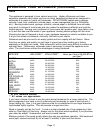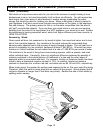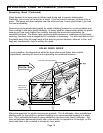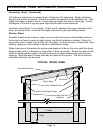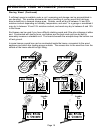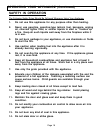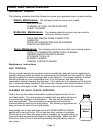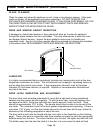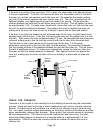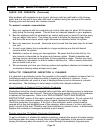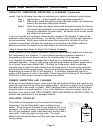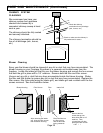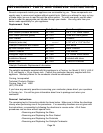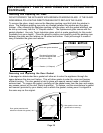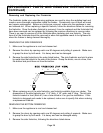
Page 19
CARE AND MAINTENANCE (Continued)
If the door is too loose (it has more than 1/16" of play), the latch needs to be adjusted closer
to the door (tightened). To do this, first remove the outer nut, the washer next to it, the latch,
the inner nut, and the two washers next to the inner nut. Re-assemble the handle, putting
only one of the washers between the door and the inner nut. The inner nut should only be
tightened slightly, over-tightening will prevent the handle from turning. Put the other two
washers between the latch and the nut farther away from the door. This will tighten the latch
by approximately 1/16". To make minor adjustments, loosen the outer nut, then turn the inner
nut until the desired distance is obtained. Then tighten the outer nut against the inner nut,
making sure the inner nut does not turn by holding it in place with an open-end wrench.
If the door is too tight (the handle can not be turned down all the way), the latch needs to be
adjusted away from the door. To do this, first remove the outer nut, the washer next to it, and
the latch. Then loosen the inner nut approximately 1/2 turn. Re-assemble the items that were
removed, making sure to line the latch up correctly with the flat side of the threaded shaft.
Test the door to see if door handle can be turned down all the way. If it still needs
adjustment, remove both of the nuts, the latch, and the washers. Re-assemble the handle,
this time putting all three of the washers between the door and the inner nut. This will loosen
the latch a significant amount. To make minor adjustments, loosen the outer nut, then turn
the inner nut until the desired distance is obtained. Then tighten the outer nut against the
inner nut, making sure the inner nut does not turn by holding it in place with an open-end
wrench.
Washers
(Used as
spacers)
Door
Handle
Threaded
portion
of handle
Latch
Door Gasket
Inner Nut
Outer Nut
CHECK FOR CREOSOTE
Creosote is a tarry liquid or solid resulting from the distilling of wood during the combustion
process. Using wet wood or burning at lower temperatures will result in a heavier creosote
deposit. Creosote vapors will condense in a relatively cool chimney flue of a slow burning
fire. As a result, creosote residue accumulates on the interior surface of the chimney and flue
pipes, considerably reducing their diameter. When ignited, this creosote makes an extremely
hot and dangerous fire. The chimney should be inspected at least once every 2 months
during the heating season to determine if a creosote build-up of approximately 1/4" has
accumulated. If this is the case, the creosote should be removed to reduce the risk of a
chimney fire.



